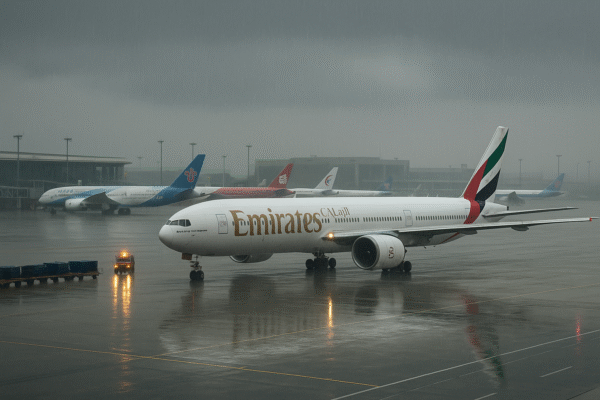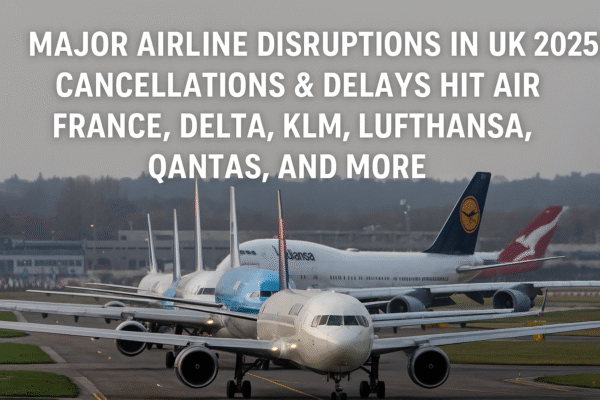Airbnb’s Slower Growth Triggers Industry-Wide Rethink: The Future of Travel & Tourism in 2025
In a post-pandemic world where travel demand continues to rise sharply, the hospitality sector faces new uncertainties. A recent market jolt has placed Airbnb in the spotlight, as its stock dropped over 7% following a conservative revenue forecast for Q3 2025. This downturn—despite impressive Q2 earnings—raises questions about the future of short-term rentals and the wider global travel and tourism industry.
Airbnb’s Strong Q2 Earnings: Growth Amid Uncertainty
Airbnb’s Q2 2025 results showcased the company’s continued resilience. The platform reported a 13% year-over-year increase in revenue, reaching $3.1 billion. Earnings per share (EPS) hit $1.03, exceeding analyst expectations. Gross booking value (GBV), a critical indicator of future demand, rose to $23.5 billion—a robust 11% increase from the previous year.
Growth was largely fueled by increased bookings in emerging markets such as Latin America and Asia-Pacific, where travelers continue to seek affordable, flexible lodging solutions. The return of international travel and heightened demand for unique accommodation experiences contributed to Airbnb’s stellar Q2 performance.
Yet, despite these positive indicators, Airbnb’s cautionary Q3 revenue forecast of $4.02–$4.1 billion (an estimated 8–10% growth) has left investors apprehensive. The forecast, while still positive, signals a notable slowdown compared to the Q2 spike.
Key Factors Behind Airbnb’s Forecast Adjustment
- Year-over-Year Comparisons Becoming Tougher
Rapid recovery in 2024, especially in Asia and Latin America, created a high base that makes future year-on-year growth more difficult to achieve. Additionally, inflationary pressures and regional regulatory changes are complicating revenue projections. - Macroeconomic Headwinds
Global economic uncertainty—spurred by rising living costs, oil price volatility, and recession fears—continues to affect discretionary spending. Travel, often considered a luxury, is particularly sensitive to such shifts. - Escalating Market Competition
The short-term rental ecosystem is no longer dominated by Airbnb. Rivals such as Booking.com, Vrbo, and region-specific startups are capturing growing market shares, particularly by offering tailored travel solutions and niche experiences.
Travelers Face Evolving Booking Trends
These economic and market forces are beginning to affect traveler experiences. Consumers may see price volatility and reduced availability across booking platforms. As companies like Airbnb recalibrate their offerings and strategies, travelers might notice a shift from standard lodging to experience-based tourism—aligning with changing consumer preferences for authentic and immersive travel.
Airbnb’s Strategic Pivot: Diversifying Beyond Rooms
In response to market saturation and fluctuating travel demand, Airbnb is investing nearly $200 million into developing services beyond traditional accommodations. These include:
- Booking services for chefs and housekeepers
- Curated local tours and experiences
- Destination-specific cultural packages
This strategic expansion aims to elevate the Airbnb experience into a lifestyle ecosystem. While these services are not expected to contribute significantly to short-term profits, Airbnb’s long-term vision revolves around positioning itself as a one-stop travel platform offering immersive, personalized journeys.
What It Means for the Wider Tourism Industry
Airbnb’s stock dip is not merely a company issue—it’s a signpost for the entire travel sector. As consumer behavior shifts and expectations evolve, tourism companies must adapt or risk falling behind. Key trends shaping the future of tourism include:
- Sustainable Travel
With increasing environmental awareness, travelers are prioritizing eco-friendly accommodations and carbon-offset options. Companies that offer green travel experiences will gain a competitive edge. - Personalized & Local Experiences
Generic travel itineraries no longer excite today’s tourists. Experiences rooted in local culture—like cooking classes, art walks, or eco-village stays—are now top priorities. Providers must innovate to deliver authentic, hyper-local value. - Flexible Travel Policies
Lingering post-COVID uncertainty makes flexibility a necessity. Platforms offering hassle-free cancellations, rebookings, and insurance options are more likely to build customer trust and loyalty.
A Broader Industry Lesson: Agility and Innovation Are Non-Negotiable
Airbnb’s evolving strategy offers a critical lesson: the travel and tourism industry can no longer depend on traditional models. Travelers want more than a place to stay—they want a story to tell. Whether it’s a boutique hotel in Tokyo, a treehouse in Costa Rica, or a food tour in Barcelona, businesses must build experiences around human connection and cultural immersion.
Smaller tourism operators, hotels, and local travel providers can seize this moment to innovate. By introducing customizable experiences, sustainability initiatives, and digital flexibility, they can compete in an increasingly fragmented and dynamic market.
Conclusion: The Road Ahead for Airbnb and the Tourism Ecosystem
Despite a temporary slowdown in its growth trajectory, Airbnb remains a dominant force in global hospitality. Its proactive diversification and willingness to evolve suggest a strong long-term strategy. For the broader travel and tourism industry, Airbnb’s experience serves as a blueprint: adapt fast, innovate continuously, and put traveler experience at the center.
As we navigate the rest of 2025, businesses that stay responsive to economic trends and evolving traveler preferences will lead the next chapter of global tourism. Whether through tech-driven platforms or grassroots local experiences, the future of travel is all about flexibility, personalization, and meaningful impact.
For more travel news like this, keep reading Global Travel Wire
















